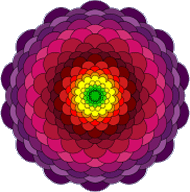Thursday, November 13, 2014
What is dopamine?
Dopamine is a type of neurotransmitter, or brain chemical. It helps level out the nervous system, thereby reducing anxiety and stress, and it is responsible for feelings of mood, attention, motivation, thinking, sleeping, seeking and reward.
NOTE: In this, and other articles, I use the terms ADD and ADHD interchangeably.
Dopamine is a type of neurotransmitter, or brain chemical. It helps level out the nervous system, thereby reducing anxiety and stress, and it is responsible for feelings of mood, attention, motivation, thinking, sleeping, seeking and reward.
The dopamine loop
In the past, scientists have held dopamine responsible for our experience of pleasure. However, recent research indicates that dopamine is actually the chemical that causes us to want, desire, seek out and search. Dopamine induces a loop - it starts us seeking and anticipating, and then we get rewarded for the seeking which makes us seek more. So, dopamine is responsible for the wanting, which triggers us to seek. When we find what we seek, we get satisfaction, or pleasure. It's actually the opioid system which allows us to feel pleasure. Feeling pleasure is, well... pleasurable, so we start the cycle again. And again: want, seek, anticipate, achieve, feel satisfied. So, what's the problem? The dopamine system is stronger than the opioid system so we tend to seek more than we are satisfied.
What does dopamine feel like in our bodies?
If all of these words and the image don't make much sense to you, try thinking about it in terms of what it feels like in your body. Although everyone experiences it differently, it basically feels like a little (or big) energy blip, or burst. It's that feeling of YES!...Let's get going!... Aaaaahhhh..... WOO-HOO! and so on.... It is the anticipatory feelings we get from our successes, completions and victories, both small and not-so-small.
ADHD and Dopamine
Although research is ongoing and often conflicts, it does appear that both scientifically and anecdotally, there is a relationship between ADHD and dopamine. Specifically, for those of us with ADHD, the problem is that we absorb dopamine too rapidly ("re-uptake") before it has a chance to do its job. We are, therefore, chronically under-stimulated. This can explain why many folks with ADD, particularly when it's unmanaged, constantly seek out stimulation, and often by things things that mimic or trick the brain. Unfortunately, not only do many of these activities NOT help us achieve our goals, they can actually prevent us from doing so, or worse, they can can harm us. Some examples of activities that can trick the brain are: computer games, texting, Facebook, Twitter, solitaire (for me it's Freecell), crossword puzzles, sudoku, crossing off the quick or minor items on our to-do list first, shopping, socializing, making art, watching TV, reading or gambling. Although low dopamine is certainly not the only reason that people engage in these activities and most are not harmful in and of themselves, they can create the feelings of reward and motivation that many of us with ADHD so crave, and which we do not get from low-interest, low-stimulation tasks such as homework, tax returns, household chores or any kind of maintenance tasks.
When we struggle to apply our under-stimulated minds to these types of activities, we often find ourselves day dreaming, bored, distracted, avoiding and procrastinating. Sometimes, and for some people, this behavior is initially unconscious or reflexive, but can also occur knowingly and guiltily. Another issue caused by problems regulating dopamine (which many with ADD are intimately familiar), is the phenomena of getting really excited and motivated to START a project, task, business, but either not finishing, maintaining or even starting. It might be really exciting to go out and buy all of the stuff for an art project or house project, but then not actually begin it. You might start it, but if it takes longer than you expected, gets hard or boring, or the novelty simply wears off, it might just get left and 'stuck' somewhere, to be forgotten and/or replaced by a new idea. (I personally, have NO idea what this might feel like.) ;-)
When we struggle to apply our under-stimulated minds to these types of activities, we often find ourselves day dreaming, bored, distracted, avoiding and procrastinating. Sometimes, and for some people, this behavior is initially unconscious or reflexive, but can also occur knowingly and guiltily. Another issue caused by problems regulating dopamine (which many with ADD are intimately familiar), is the phenomena of getting really excited and motivated to START a project, task, business, but either not finishing, maintaining or even starting. It might be really exciting to go out and buy all of the stuff for an art project or house project, but then not actually begin it. You might start it, but if it takes longer than you expected, gets hard or boring, or the novelty simply wears off, it might just get left and 'stuck' somewhere, to be forgotten and/or replaced by a new idea. (I personally, have NO idea what this might feel like.) ;-)
I've attached a link to a short, informative but easy-to-follow, animated video, which explains how dopamine is the cause of our dependence or addiction to texting and other social media.
www.psychologytoday.com/blog/brain-wise/201408/are-you-addicted-texting
www.psychologytoday.com/blog/brain-wise/201408/are-you-addicted-texting
If you have identified with some, or much of what has been described here, you may be wondering what to do about it. In my coaching practice, I work with teens, college students and adults who struggle with the challenges ADHD can present, including our ever increasing reliance, even even addiction, to our cell phones, social media and other ways we avoid what is painfully boring or monotonous. There are many strategies we can employ to overcome these and other ways ADHD can get in our way of achieving goals and enjoying our lives. In addition, in the near future, look out for 'Part II' of this blog, in which I will include specific strategies to address issues and problems caused by a lack of dopamine.
NOTE: In this, and other articles, I use the terms ADD and ADHD interchangeably.


- THE QUESTIONS ARE MORE IMPORTANT
- WHEN YOU WANT TO BELIEVE...
- FEAR OF BOREDOM
- 11 REASONS MOST NEW YEAR'S RESOLUTIONS FAIL
- ON CONQUERING PROCRASTINATION
- Rock Your Bottom?
- MAKING THE MOST OF YOUR SUMMER
- From SCARED to SACRED
- NO MORE RESOLUTIONS!
- BACK TO WORK
Archives
December 2012
February 2013
May 2013
October 2013
November 2013
January 2014
March 2014
June 2014
July 2014
November 2014
December 2014
February 2015
March 2015
June 2015
August 2015
September 2015
October 2015
December 2015
January 2016
May 2016
July 2016
January 2017
March 2019
July 2019
August 2019
May 2020

![]()

 Home
Home About Coaching
About Coaching Is Coaching For Me?
Is Coaching For Me? Coaching v. Therapy
Coaching v. Therapy Coaching with Amy
Coaching with Amy ADD Coaching
ADD Coaching Logistics
Logistics About Amy
About Amy Testimonials
Testimonials Events
Events Meaning of Syndala
Meaning of Syndala
